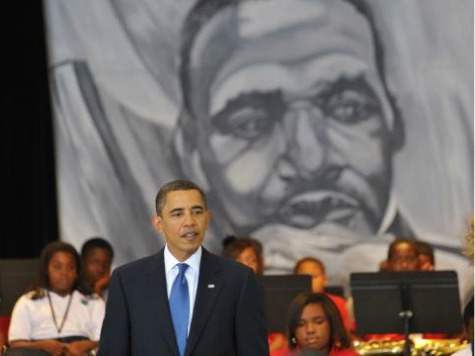
President Barack Obama’s supporters and the mainstream media have been perpetuating two pieces of false conventional wisdom heading into Election Day — that demographics alone will power Obama to victory on Election Day and Democrats are assured of a long-term demographic victory over Republicans.
They believe minorities and young voters will push Obama to victory in 2012 and guarantee Democrats even bigger victories in subsequent elections.
In its last survey, Gallup predicted the electorate will be 78% White, 11% Black, and 7% Hispanic, which is what the electorate looked like in 2008, which means minorities will most likely not represent a greater share of the electorate than they were in 2008.
In fact, even left-of-center websites like the Daily Beast lamented that young voters and minorities may not propel Obama to victory in 2012, but the article still assumed Democrats would win the long-term war.
The Obama campaign remains optimistic on demographics heading into Election Day:
“The Romney campaign believes the electorate still looks like it did in 2004. It doesn’t. American voters are more diverse than ever,” national field director Jeremy Bird wrote in a memo this week. “More Latinos will vote this year than ever before — both in raw numbers and as a percentage of the electorate in battleground states — and the president will win the most Latino votes of any presidential candidate ever. Women continue to make up more than half of the electorate, and we’re leading among women by double digits nationally and in every battleground state, and for good reason.”
But, as Gallup noted, “given the relatively similar demographic composition of the 2012 and 2008 electorates, the election’s outcome may hinge more on how groups vote rather than to what extent they will vote. And most groups are currently less likely to support Obama now than they were in 2008.”
And Obama’s support is down considerably among nearly every demographic group from 2008.
A recent Gallup survey found Obama was down 14 points among men from 2008, 10 points among whites, four points among Hispanics, four points among those under 30, four points among voters 30 to 49, 16 points among those with post graduate degrees, 24 points among college graduates, and 8 points among those with “some college”education.
Young voters, especially minority voters, are less enthused about Obama. Even ultra-liberal magazines like the Nation have acknowledged this reality:
But the number of millennials who say they will vote remains lower than in past years–fewer than half in the Harvard poll. That may reflect general disinterest in electoral politics, but it also mirrors a corresponding drop in the number who are registered to vote in the first place. The percentage of young Americans who are registered this year is the lowest of the past five presidential elections. Only half of adults under 30 say they are sure they are registered, down 11 points from 2008 and 7 points from 2004. Several factors account for the decline, including shrinking infrastructure for nonpartisan youth engagement and the lack of Democratic primaries, leading to an organizing effort focused on a handful of states.
In addition, young voters who favor Romney — though there aren’t as many as those who favor Obama — are, according to the survey, more likely to turnout because they are more enthused about Romney’s candidacy than Obama’s young voters are about Obama’s:
Even among registered voters under 30, however, the expected turnout is 9 points lower than it was at the same time in 2008. The fissure between first time voters, who appear to be more conservative than their older peers, may also lessen the impact of millennial voters. And while Romney supporters account for a smaller portion of millennials, they appear likely to turnout in higher percentages than young Obama supporters.
As for young Hispanics, the group not only is tough to poll but also appears to “least likely” go to the polls for Obama:
Perhaps the most critical and unpredictable segment of the millennial electorate is young Latinos. Staunch Obama supporters when they vote, young Latinos are the group that appears least likely to do so.
Politico posed a more relevant question for Democrats going forward and did not assume Democrats would win the long-term demographics battle:
Indeed, the bigger question for Democrats in future cycles may not be whether Obama’s radically unconventional coalition is strong enough to produce victory, but whether another candidate could replicate Obama’s reach among nonwhite voters and young people.
Even with the country’s first black president up for re-election, minorities are less fired up about Democrats and Obama than they were four years ago, which does not bode well for Obama. Support for Romney — and Republicans — among whites and independents is considerably greater than it was in 2008 in nearly every state and national poll.
Once Obama is not on the top of the ticket, Democrats will struggle even more to retain high levels of support among minorities, and a long-term demographic victory for Democrats at the polls is in no way guaranteed in future elections and should not be assumed.
In fact, 2008 may turn out to be the high-water mark for Democrats when it comes to support among minorities and young voters.

COMMENTS
Please let us know if you're having issues with commenting.